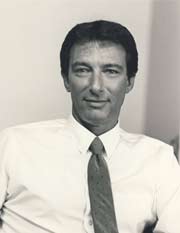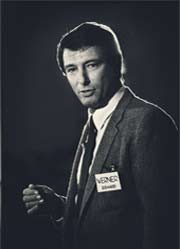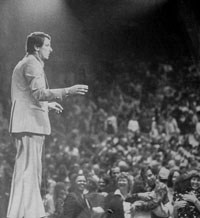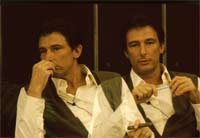‘Me generation’ – a thing of the past
San Francisco – 1980
There’s been a shift in the rules for successful living, according to Werner Erhard.
Speaking to a crowd of some 8,500 at San Francisco’s Cow Palace in January 1980, the founder of “est” told them to look at the world from a “you AND me” perspective, instead of a “you OR me” standpoint.
Departing from philosophies emphasized by self-centered “self-help” publications, Erhard said, “We need a whole new set of rules to live successfully in a ‘you and me’ world. We are still trying to make it with ‘you or me’ rules.”
He said, “In the past, the way I had a glass of water was to hold on to it. Now, the way to assure you have a glass of water is to assure everyone has one.”
The new type of thinking, which Erhard says people have no training for, could breed what might be called failure. Erhard wards that this is not truly failure. People can expect to “fail,” he said, but failure in the context that “the world works for everyone” is an opportunity for a breakthrough.
Erhard says, “Each person’s life is shaped by a basic principle” which “thereafter unconsciously determines the shape and scope of their lives.” People, he says, need to develop the basic principle, “The world can work for everyone.” He emphasizes that the individual does make a difference in the world.
When they adopt these attitudes, he says, they will see a shift in the way they experience life.
He said he believes what people want to do is make a difference in the world. The “be careful, get everything you can” kind of thinking tends to dictate not only how people live and act, but how they look at the world.
What a person now needs to do, he says, is to “look at life, see what is wanted and needed, and start producing it.”
Erhard says each person must choose, for himself, the way he will make a difference in the world. – Richard Guarino – San Francisco
This Is It – An Interview With Werner Erhard
New Sun Magazine, December 1978
The truth is not found in a different set of circumstances. The truth is always and only found in the circumstances you’ve got.
New Sun: I’d like to know what you feel is the single most important thing a human being can learn in life?
Werner Erhard: The problem with the answer to that question is that it depends on where the person is. I think that until you know that life does not work you’re unprepared to know anything else. And yet that’s not the most important thing to know. But it might be the first thing to know.

Werner Erhard
By John Johns, Published in PSA Magazine, May 1976
“What is, is. And what isn’t isn’t”
Sixteen years ago there was no Werner Erhard. Five years ago there was no est. Today Werner Erhard and est (Erhard Seminars Training) are truly an American phenomenon, a thriving success in the fertile garden of modern pop psychology.
Werner Hans Erhard was born Jack Rosenberg 40 years ago in Philadelphia. He married his high school sweetheart and, in true story-book fashion, proceeded to raise a family of four children. But in 1960 the story took an abrupt turn—Jack Rosenberg ran away with Ellen, who is now his second wife. With characteristic candor, Werner admits that he took off “to avoid the responsibilities I had.” (He has since become very close to his first family, while also raising three children in his second marriage.)
It was in St. Louis that Jack Rosenberg became Werner Erhard, borrowing from Werner Heisenberg, Nobel Prize winning physicist, and former West German Chancellor Ludwig Erhard. From St. Louis, Erhard made his way to California, where he worked for a correspondence school. Not long afterward he went to Spokane and a job managing a sales office for Britannica’s Great Books series.
In 1963 Werner took a job with the Parents Cultural Institute, a subsidiary of Parents Magazine, which published and sold encyclopedias. Within three years he had become vice-president, having excelled as a sales manager. He remained there for six years.
Werner’s next position was with the Grolier Society, Inc. Their business was also encyclopedias, and again Werner demonstrated remarkable organizational and motivational skills in sales.
Prison Possibilities
The est Training was first presented in Prisons in July 1974 at the Lompoc Federal Penitentiary. 54 inmates and 4 staff members took the training. The prison staff responded enthusiastically to the experience of the training process but even more significantly reported that “even the most radical inmates who took the training spoke highly of it. More importantly perhaps, inmates who had records of problems began ‘getting along.'” Read More
By Marcia Seligson, Published in Cosmopolitan Magazine, June 1975
About three years ago I was at a dinner party in Beverly Hills, a small covey of movie-biz folk. In the vacuum between the gazpacho and the paella, the man to my left suddenly bellowed to the room at large: “Hey, I did this incredible thing last month that’s changed my whole life. It’s called E.S.T.” All heads swiveled in his direction, everybody on the make for something to change our lives. Anything. The faster the better.

What is est
est publication , May 16, 1977
The est training is sometimes confused with other disciplines, yet it is none of them. est is not group therapy, sensitivity training, encounter, positive thinking, meditation, hypnosis, mind control, behavior modification, religion, or anything else you might think of. It is not therapy; it is not “human potential;” not psychology. And, finally est is not a movement – there is nothing to belong to; there is nothing to join; there is nothing to remember and nothing to believe in; there isn’t even anything to do after you’ve finished the training.
est does not change what one knows; it transforms the way in which one knows.
Eleanor Links Hoover, October 1978
One reason why the public seldom sees much deep, penetrating reporting and/or commentary about any contemporary psychological movement is that it is distinctly unfashionable for journalists to write anything that may be interpreted as favorable about such phenomena. Never mind whether it’s true or not. The silent rule is, “If you can’t be critical, don’t write it.”
Well, this is to serve notice to any potential head-lopper that I choose not to be intimidated. Sorry. I just can’t join the cynical press bandwagon. est is – and remains – one of the most fascinating movements, events, phenomena (take your pick, it still defies analysis) I have ever observed and reported on. The fact that it isn’t what it seems to be (what is?) and that it is as elusive as quicksilver to describe only enhances the fascination as far as I’m concerned. For me, it is, among other things, an excursion into High Philosophy – a miniseries of sorts into issues raised by Plato, Sartre, Wittgenstein. Bill Bartley, philosophy professor at California State University at Hayward once told me, “What est is doing is making available for the first time on a wide, popular basis, the key ideas and problems of philosophy.”

Operating Principles for a You and Me World
From the March 1980 Graduate Review report on ‘A World That Works For Everyone’
Since we have been raised and educated in a you or me world, and since very few of us have noticed the shift to you and me, we are going to have to work out the rules for living on our own. We won’t get much help. Werner shared his own perceptions of some of the other new rules, or operating principles, for the you and me context.
- Respect the other person’s point of view, whether or not you agree with it. Recognize that if you had their history, their circumstances, and the forces that play on them, you would likely have their point of view.
- Consider life a privilege – all of it, even the parts that are difficult or seem a waste of time.
- Give up the islands that reinforce mediocrity, the safe places where we gossip and complain to one another, where we are petty.
- Take a chance. Be willing to put your reputation on the line; have something at stake.
- Work for satisfaction rather than for credit
- Honor your word. There will be times when the circumstances of life will make you forget who you are and what you’re about. That is when you need to be committed to honoring your word, making what you say count.
Q: What was the est Training?
A: The est Training was a 60-hour educational experience that created opportunities for people to realize their potential, to transform the quality of their lives. It was about an expansion of that area of life called aliveness. The purpose of the est Training was to transform your experience of living and it operated under the principle that there was only one thing powerful enough to transform the quality of your life in just four days and that was you.
The est Training was created by Werner Erhard in 1971. The Training was offered throughout the United States, as well as in Canada, England, Israel, Australia and India and it was retired in 1984.
Full Article
